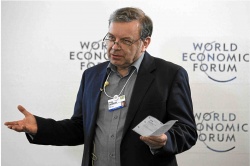Philip Campbell

Philip Henry Montgomery Campbell (born April 19 1951)[1] has, since 1995, been the editor-in-chief of the science journal, Nature, part of Nature Publishing Group.[2][3]
Education
Campbell was educated at Shrewsbury School[1] and went on to study aeronautical engineering at the University of Bristol, graduating with a BSc degree in 1972.[4] He gained an MSc in astrophysics at Queen Mary, University of London[5] before doing his PhD in upper atmospheric physics at the University of Leicester.[6] His doctoral and postdoctoral research was on the physics of the ionized upper atmosphere and effects on radio propagation, using the latter as a probe of the lower ionosphere.[7]
Nature
<youtube size="medium" align="right" caption="Philip Campbell speaks on a panel on open access and editorial quality organised by the National Union of Journalists and the Wellcome Trust, 6 February 2013">uyeRAhxcPjQ</youtube>After a period of post-doctoral research in physics, Campbell joined Nature in 1979, becoming Physical Sciences editor in 1982. He left Nature in 1988 to be the founding editor of Physics World the magazine of the Institute of Physics.[8]
Climate-gate role
Campbell was appointed a member of an independent panel established in February 2010 by the University of East Anglia to investigate the controversy surrounding the publication of emails sent by staff at the university's Climatic Research Unit (CRU). Due to publicity about a 2009 interview with Chinese State Radio[9] during which he expressed support for the CRU scientists, he resigned just hours after the panel was launched.[10]
Affiliations
- 2003-2012, trustee of the charity Cancer Research UK and the chairman of its Public Policy Advisory Group.[8][11]
- visiting scholar at Rockefeller University in spring 2008.[12]
- Science Media Centre member of the Board from 2003 to 2012 and then of the Advisory Committee from 2012.
- Founding Trustee, research funding charity MQ: transforming mental health[13]
- World Economic Forum, attended the annual meeting in Davos in 2011,[14] 2013.
Notes
- ↑ 1.0 1.1 CAMPBELL, Philip Henry Montgomery Who's Who 2013, A & C Black, an imprint of Bloomsbury Publishing plc, 2013; online edn, Oxford University Press (subscription required)
- ↑ Nature Publishing Group - Executive Committee - retrieved 13 October 2008
- ↑ About the Editors, Nature, accessed 10 August 2013
- ↑ Interview with Philip Campbell in Nonesuch, the University of Bristol Alumni Magazine, Spring 2008
- ↑ Queen Mary College Council paper on Honorary Degrees and Fellowships - retrieved 23 April 2008
- ↑ Philip Campbell The influence of the ionosphere on low frequency radio wave propagation University of Leicester, 1979.
- ↑ Institute of Physics Profiles: Dr Philip Campbell
- ↑ 8.0 8.1 Cancer Research UK How we are governed: Trustees, retrieved from the Internet Archive of 3 July 2010 on 10 August 2013
- ↑ http://english.cri.cn/7146/2009/12/03/1901s533264.htm
- ↑ Batty, David and Adam, David. "Climate emails review panellist quits after his impartiality questioned", The Guardian, 12 February 2010; Clarke, Tom. "'Climate-gate' review member resigns", Channel 4 News, 11 February 2010; Climategate e-mails inquiry under way, BBC News, 11 February 2010.
- ↑ How we are governed: Trustees, retrieved from the Internet Archive of 26 April 2012 on 10 August 2013
- ↑ Rockefeller news: Visiting scholars - retrieved 15 October 2008
- ↑ World Economic forum Philip Campbell, accessed 13 August 2013
- ↑ Magnum Photos Richard Kalvar - SWITZERLAND. Davos. World Economic Forum. 2011., accessed 14 August 2013